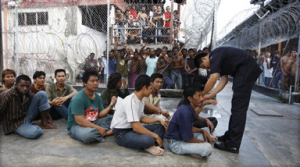Ever since I was 13 and went on a family vacation to Phuket, Thailand, I have been obsessed with making plans to one day return. As I grew older and read more about Thailand, however, I was starting to learn that not everything about this country was beautiful. Human trafficking has been a huge problem within Thailand for many years, and I’ve devoted much time to educating myself on the issue. The other day while I was reading some personal accounts of trafficking, I came to a startling realization: While numerous education campaigns exist for the dangers of sex trafficking of women and child laborers, little awareness is raised on how little protection exploited men receive. I think part of the problem with this lack of legislation protecting men is linked to public perception. People believe that men are more capable of protecting themselves and don’t require progressive laws and organizations to speak on their behalf. Even in browsing statistics from official anti-trafficking projects, little data exists on the trafficking of men.
With the economic crisis affecting people worldwide, it has made men more desperate to find work, and thus more susceptible to falling into the traps of trafficking rings. The seafood industry in Southeast Asia is booming and so the main sector for forced labor for men, is at sea. Company owners take advantage of the lack of labor rights and weak law enforcement to exploit these men that work on boats. Migrants are lured to Thailand with false promises of steady pay and legal paperwork that will entitle them to reside in Thailand. Upon arrival though, the men are stripped of all paperwork and identification, and then promptly herded onto boats. They are then forced to work long hours for no pay and are constantly beaten during the years they spend at sea. Fishing owners even coordinate pickups in the middle of the ocean to transfer the men to another boat while the original returns with the seafood. This way, the men have no chance to escape other than jumping into the water, guaranteeing a certain death. So once at sea, there is little that can be done for these poor men. That’s why I am surprised that even in the fishing industry, where male workers are most prevalent, still more protections exist for women and children. Why is there this disparity? I don’t have a straight answer to this difficult question and like I mentioned before, there is sadly very little studies focused on the exploitation of men. What I can gather from the little information that is given is that:
- Gender and social stereotypes have prevented government officials from categorizing men as victims of trafficking.
- Unlike women and children, men tend to work in sectors that are difficult to track and regulate. Women as sex workers are easily identified and rarely hidden from public view in order to lure buyers. For men, it seems to be a different story.
- All this is exacerbated by the general disposition of men, for men are less likely than women to report and speak publicly about personal experiences with trafficking.
Only in 2008 were men finally included in anti-trafficking legislation in Thailand. Before this, they were treated merely as illegal immigrants hiding out on boats – rather than victims of trafficking and abuse – and deported to Cambodia, Myanmar, Vietnam, or whichever neighboring country officials assumed they originated. Even though I would love to consider this new anti-trafficking law as groundbreaking, the sad truth is that there’s a huge disconnect between creating laws and what is actually done in terms of prosecution and protection. Men are still rarely protected and hundreds (but probably even more are undocumented) have still been wrongly deported since 2008. Lack of sufficient legislation to protect men, coupled with corrupt officials and police figures complicates matters even more. Many members of government are unwilling to take big steps to curb this exploitation in the fishing sector, because it is truly a lucrative business.
though I would love to consider this new anti-trafficking law as groundbreaking, the sad truth is that there’s a huge disconnect between creating laws and what is actually done in terms of prosecution and protection. Men are still rarely protected and hundreds (but probably even more are undocumented) have still been wrongly deported since 2008. Lack of sufficient legislation to protect men, coupled with corrupt officials and police figures complicates matters even more. Many members of government are unwilling to take big steps to curb this exploitation in the fishing sector, because it is truly a lucrative business.
I know that trafficking is an incredibly difficult issue to deal with, but Thailand needs to strive to work together with neighboring countries to create laws that can better deal with preventing trafficking, and then protecting the men who are trapped in trafficking rings. If we raise awareness and more people realize that male trafficking is an issue, perhaps we can increase media coverage to have NGOs and international organizations start including men in their projects. I also advocate fostering awareness for the communities of exploited men. Education campaigns can be useful in so many ways: these men will become aware that they are being exploited, learn that NGOs exist to help them, and make them realize that it’s ok to speak out on their personal experiences. There’s nothing to hide or be ashamed of. It is of course difficult to alter socio-cultural ways of thinking, but in my eyes, any attempt towards change – no matter how small – will eventually create big changes.



2 pings